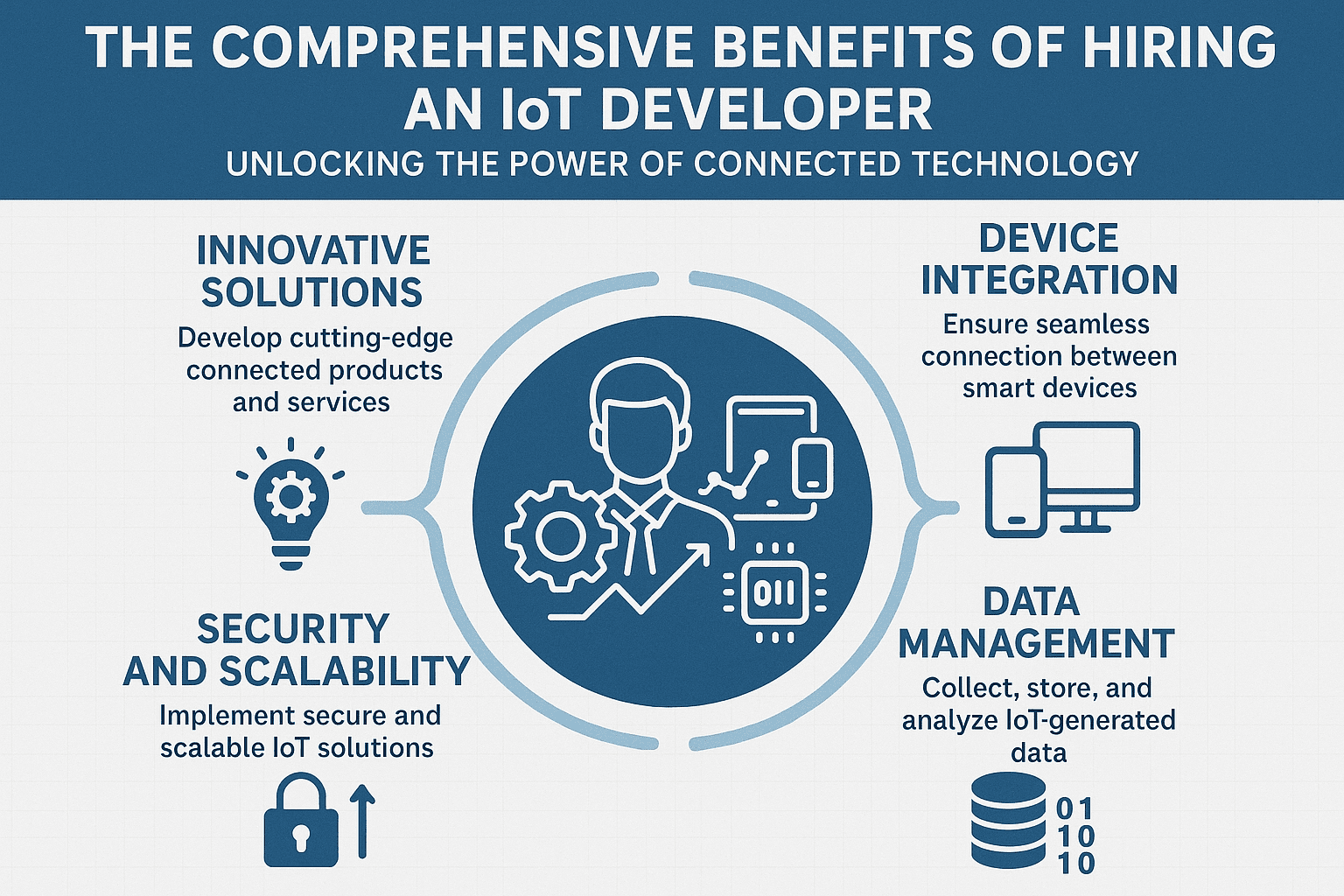The Comprehensive Benefits of Hiring an IoT Developer: Unlocking the Power of Connected Technology

As the Internet of Things (IoT) reshapes industries and business models worldwide, hiring a skilled IoT developer has become a pivotal step for organizations aiming to harness this transformative technology. IoT developers bring a unique blend of hardware expertise, software development, data analytics, and cybersecurity skills that are essential for building scalable, secure, and efficient IoT solutions. This blog explores in detail the expansive benefits of hiring an IoT developer and how they can drive innovation, operational excellence, and competitive advantage for your business.
1. Enhanced Operational Efficiency Through Real-Time Monitoring and Automation
IoT developers enable businesses to implement real-time monitoring systems that track equipment, assets, and processes continuously. This capability allows organizations to transition from traditional scheduled maintenance to predictive and just-in-time maintenance, significantly reducing downtime and boosting productivity. By automating repetitive and time-consuming tasks with smart IoT devices, companies can optimize workflows, reduce human error, and improve overall operational efficiency.
For example, manufacturers can monitor machine health in real time, automatically scheduling maintenance before failures occur, thus avoiding costly production halts. Similarly, logistics companies can track shipments and vehicle conditions to streamline delivery processes.
2. Predictive Maintenance and Cost Reduction
One of the most impactful benefits IoT developers bring is the ability to implement predictive maintenance strategies. By using sensors and data analytics, IoT systems detect early warning signs of equipment degradation or failure. This proactive approach reduces unexpected breakdowns, extends asset lifespan, and lowers maintenance costs.
According to industry research, predictive maintenance can reduce maintenance costs by up to 30% and downtime by 45%, translating into substantial savings and improved service reliability.
3. Improved Safety, Security, and Compliance
IoT developers design solutions that enhance workplace safety and security by integrating sensors, cameras, and smart locks to monitor environments and alert personnel to potential hazards. In high-risk industries such as manufacturing, construction, and healthcare, these systems help protect employees and assets by providing real-time alerts and automated responses to emergencies.
Additionally, IoT developers ensure that devices and data comply with industry regulations and standards, helping businesses avoid penalties and build trust with customers through robust security and privacy practices.
4. Data-Driven Insights for Smarter Decision Making
IoT devices generate vast amounts of data that, when properly collected and analyzed, provide invaluable insights into business operations, customer behavior, and market trends. IoT developers build data pipelines, dashboards, and analytics tools that transform raw sensor data into actionable intelligence.
These insights enable businesses to optimize resource allocation, improve product quality, tailor services, and identify new revenue opportunities. For example, retailers can analyze foot traffic patterns to optimize store layouts, while energy companies can monitor consumption to improve efficiency.
5. Scalability and Flexibility for Future Growth
IoT developers design modular and scalable architectures that allow businesses to start small and expand their IoT deployments as needed. By leveraging cloud platforms such as AWS, Azure, or Google Cloud, they enable seamless scaling of device networks, data storage, and processing power.
This flexibility ensures that your IoT solution can adapt to evolving business requirements, incorporate new technologies, and support an increasing number of connected devices without compromising performance.
6. Integration Expertise Across Diverse Systems and Protocols
IoT ecosystems involve a complex interplay of hardware, software, communication protocols, and cloud services. Skilled IoT developers have deep knowledge of protocols like MQTT, CoAP, Zigbee, Bluetooth, and LoRaWAN, enabling them to integrate heterogeneous devices and systems into a unified, interoperable network.
This expertise minimizes compatibility issues, reduces integration costs, and accelerates time-to-market for IoT projects.
7. Robust Security Architecture and Risk Mitigation
Security is paramount in IoT deployments due to the sensitive nature of data and the potential risks of device vulnerabilities. IoT developers implement multi-layered security measures including encryption, secure boot, authentication, and regular vulnerability assessments.
Their proactive approach helps prevent data breaches, unauthorized access, and cyber-attacks, safeguarding both your infrastructure and customer trust.
8. Faster Time-to-Market with Agile Development and Prototyping
IoT developers utilize rapid prototyping platforms such as Arduino and Raspberry Pi to quickly build and test proof-of-concept models. This agile approach allows businesses to validate ideas, gather user feedback, and iterate designs efficiently.
By streamlining development cycles, IoT developers help organizations launch innovative products and services faster, gaining a competitive edge in fast-moving markets.
9. Cost Efficiency Through Optimized Resource Allocation
Hiring an IoT developer allows businesses to allocate resources wisely by focusing on core competencies and outsourcing complex IoT development tasks to experts. This reduces the need for extensive in-house infrastructure and training.
Moreover, IoT solutions developed by professionals optimize energy consumption, reduce waste, and improve asset utilization, contributing to long-term cost savings.
10. Industry-Specific Solutions Tailored to Unique Business Needs
IoT developers bring domain-specific knowledge that enables them to tailor solutions for various sectors including healthcare, agriculture, manufacturing, logistics, smart cities, and retail. Their understanding of industry challenges, regulatory requirements, and user expectations ensures that IoT implementations deliver maximum value and compliance.
For instance, in healthcare, IoT developers create remote patient monitoring systems that improve care quality, while in agriculture, they develop precision farming tools that enhance crop yields.
11. Continuous Support, Maintenance, and Innovation
IoT is a rapidly evolving field, and ongoing support is essential to maintain system reliability and security. IoT developers provide continuous monitoring, updates, and feature enhancements to keep your solutions aligned with technological advancements and business goals.
Their commitment to innovation ensures your IoT infrastructure remains scalable, secure, and competitive over time.
12. Empowering Remote Work and Mobility
IoT technologies enable employees and managers to monitor and control operations remotely, increasing mobility and flexibility. IoT developers build solutions that support remote diagnostics, asset tracking, and mobile device management, allowing businesses to operate efficiently regardless of physical location. This capability is especially valuable in today’s increasingly distributed work environments, reducing dependency on centralized offices and lowering operational costs.


